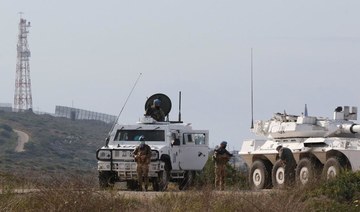BEIRUT: The World Bank has rejected an appeal by Lebanon to subsidize medicines in the crisis-hit country despite warnings that vital drug stocks are running low.
Head of the Lebanese Parliamentary Health Committee, Assem Araji, held talks with World Bank representatives via video conference on Friday in a bid to win additional financial support to ensure medical supplies in Lebanon remain stable.
However, the World Bank made clear that “no assistance will be provided to Lebanon without immediate government reforms,” Araji said.
The pivotal meeting follows a warning by Lebanon’s central bank that with reserves running low, it will be unable to subsidize essential goods, such as medicines, flour and fuel, beyond early 2021.
Concerns are mounting among Lebanese that the cost of drugs will soar amid a sharp devaluation in the local currency.
Health officials say a shortage in medicines has been worsened by panic buying and hoarding prompted by the central bank warning.
Araji said that the removal of subsidies on medicine will leave health institutions at risk of collapse.
“We will be facing a great disaster if the subsidy on essential medicines is removed. Our situation is very sad, and we are heading toward a major crisis,” he said.
The World Bank’s hard-line stance is part of growing international pressure on the Lebanese political leadership to form a government capable of implementing urgently needed reforms.
FASTFACT
Concerns are mounting among Lebanese that the cost of drugs will soar amid a sharp devaluation in the local currency.
On Saturday the UN Special Coordinator for Lebanon Jan Kubis tweeted a reminder to the country’s leaders “of the need for reforms that will restore the confidence of the Lebanese and international communities.”
Authorities warn that with no end in sight to the political deadlock, Lebanon is sliding toward economic, financial and social disaster.
MP Mohammed Al-Hajjar, from the Future bloc, told Arab News: “We do not know where the international pressure will lead. Prime Minister Hariri wants to form a government according to the French initiative, which was agreed on by everyone. But if there is no agreement, the country is heading toward chaos.”
Al-Hajjar said that Hariri has promised to be frank with the Lebanese, adding that “there are parties that always speak with the logic of quotas.”
However, the Free Patriotic Movement (FPM) said after a meeting of its political council on Saturday that Hariri ‘bears the responsibility for the delay in forming the government.”
The FPM said that it “will not back down in the battle for a forensic audit of the accounts of the central bank.”
MP Alain Aoun from the Strong Lebanon bloc said that “the basic components in the formation of the government cannot be neglected.”
The naming of ministers and election of ministerial portfolios is a “participatory process,” he added.
Aoun described the relationship between the FPM and the Future bloc as “characterized by estrangement.”
During a religious event on Saturday, Maronite Patriarch Bechara Al-Rahi renewed his criticism of “the loss of wisdom and conscience among political officials,” warning that “the coming days will be more difficult than today because of the condemned political practice.”
Meanwhile, the UN peacekeeping force in Lebanon (UNIFIL) said one of its convoys had been attacked by civilians on Friday in the village of Kawtharia Al-Siyad in southern Lebanon.
UNIFIL spokesman Andrea Tenente said that equipment was stolen from the convoy during the attack, which took place in the Zahrani area, outside the mission’s area of operations.
He said that freedom of movement and safety “are an integral part of the effective implementation of the (peacekeeping force’s) mandate.”
“Lebanese authorities must guarantee UNIFIL’s safety, security and freedom of movement,” he added.
UNIFIL and the Lebanese army are investigating the incident.



























